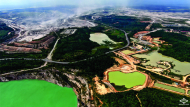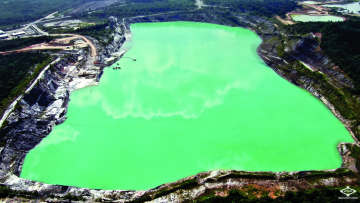Adaro forced to sell its thermal coal business unit facing difficulties in raising finance

The success
After major commercial banks, including BNP Paribas, Standard Chartered, DBS, and Deutsche Bank, distanced themselves from Adaro, signalling a distrust from investors in the company’s inadequate transition plans, the Indonesian conglomerate chose to spin-off its thermal coal business unit, Adaro Andalan Indonesia. The move signalled Adaro’s effort to remain competitive in a transitioning world and, with a smaller percentage of revenue being tied to coal, become attractive to a large and more climate-conscious investor base. Earlier this year, Adaro had also chosen not to refinance a USD 750-million bond.
BankTrack's role
BankTrack raised awareness on the risks and human rights, environmental, and climate impacts linked to Adaro’s coal business and damaging projects, such as Adaro’s North Kalimantan aluminium smelter. BankTrack’s engagement with Adaro’s financiers and the organisation of a series of global coordinated actions against them proved effective in keeping the spotlight on this damaging company and the pressure high on its funders.
Adaro Energy Indonesia is feeling the pressure of the energy transition.
Last month, Adaro did not refinance its $750-million bond. This potentially indicates a reaction to market conditions and a sign that the company’s continued coal expansion and mounting environmental and human rights controversies have become too risky for banks and investors to ignore. Major players including Hyundai, BNP Paribas, Standard Chartered, DBS, and Deutsche Bank recently distanced themselves from Adaro, signalling growing distrust from investors and steel buyers in coal companies with inadequate transition plans.
Another clue that Adaro is feeling the pressure is its recent decision to sell 99.99% of its shares in its subsidiary PT Adaro Andalan Indonesia, its thermal coal business unit. This shows how Adaro is desperately trying to remain competitive in a transitioning world and, with a smaller percentage of revenue being tied to coal, become attractive to a large and more climate-conscious investor base.
The controversies surrounding Adaro include environmental disasters, community displacements and accusations of greenwashing—all of which have fuelled public outcry and established the Indonesian coal miner as a financial and reputational liability.


